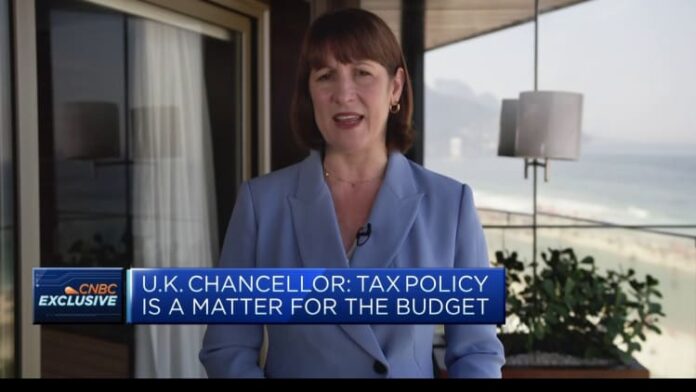Close up and side view of classic Georgian buildings in London, England, UK.
Color Hunter – Color Hunter | Moment | Getty Images
LONDON — London landlords are selling their rental properties at record rates as the UK Labour government's expected tax hikes put further pressure on the once-lucrative investment sector.
Almost a third (29 percent) of the houses currently for sale in the capital were previously rented, according to data published on Thursday by the property portal Rightmove.
The increase reflects a general rise in rental property sales across the UK, with 18% of all listings nationwide having previously been rented, according to Rightmove.
Rightmove said it was not yet clear whether the figures indicated a “mass exodus” of landlords, but rather a gradual decline in the attractiveness of the rental property sector. The average over the past five years for sales of former rental properties has been 14 percent, while the proportion of former rental properties on the market in 2010 was 8 percent, Rightmove said.
The company highlighted that it expects tax increases in Chancellor Rachel Reeve's upcoming Autumn Statement on October 30 – including a possible increase in capital gains tax (CGT) – to be a “potential driver” of the increased sales.
Prime Minister Keir Starmer has already warned that October's budget would be “painful” after the government said it discovered a £22 billion ($29 billion) hole in public finances when it took office in July.
Reeves declined to comment on the contents of her budget, telling CNBC in July that such matters “rightly belong in the budget.”
There is speculation about tax increases, including a convergence of capital gains tax, which would bring it in line with the graduated rates of income tax. Currently, landlords of rental properties must pay a flat rate when they sell their property – 18% for basic rate taxpayers and 28% for higher rate taxpayers.
Marc von Grundherr, director of London-based real estate agency Benham and Reeves, said the possible convergence of capital gains tax was “naturally” a cause for concern for many landlords.
“If the Labour government goes ahead with this move, it could result in a significant increase in the taxes that the average landlord would have to pay when the time came for them to leave the sector,” he said.
“This would be a further blow to those providing much-needed housing in the rental sector, following a series of legislative changes in recent years that have impacted profitability.”
The UK buy-to-let market – once a key area of wealth creation – has come under pressure in recent years after several incentives, including tax relief for property investors, were removed. The recent cost of living crisis and higher interest rates have also reduced affordability for landlords, with the number of new buy-to-let mortgage approvals set to fall in 2023 for the first time since they were introduced nearly three decades ago.
According to Savills, the stock of investment properties and second homes is currently 8.7 percent lower than it was three years ago.

This happened against a backdrop of a general slump in the property market, which is now beginning to ease somewhat. Falling borrowing costs following the Bank of England's interest rate cut in August have sparked a boom in home purchases.
According to Rightmove, the total number of new properties on the market is currently up 14% compared to 2023.
Rightmove itself has been touted as a possible takeover target for property company REA Group, owned by Rupert Murdoch. The company said on Monday that it sees growth opportunities in the UK market. Still, property expert Tim Bannister of Rightmove said the recovery in the property sector may not be felt across the board and warned that a further crackdown on buy-to-let investors could exacerbate existing affordability problems in the rental market.
“A healthy private rental sector needs investment from landlords to offer tenants a good choice of housing,” he said.
“We have seen in recent years how the imbalance between supply and demand can contribute to rising rents, so there is concern that unless landlords are encouraged to stay in the rental sector and not leave it, tenants will pay the price,” he added.














